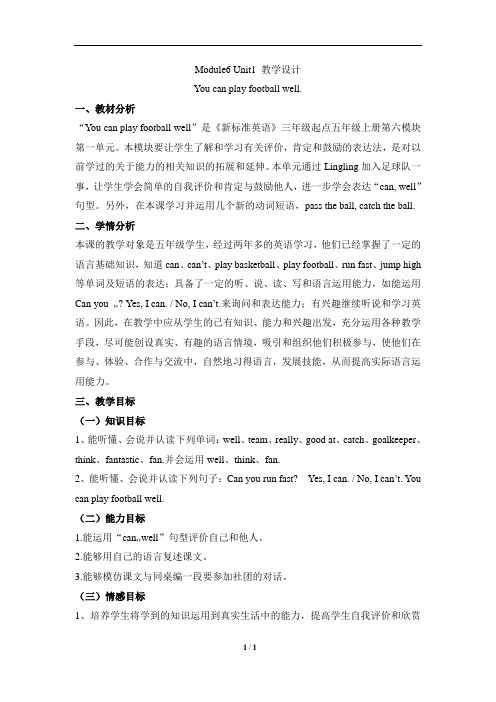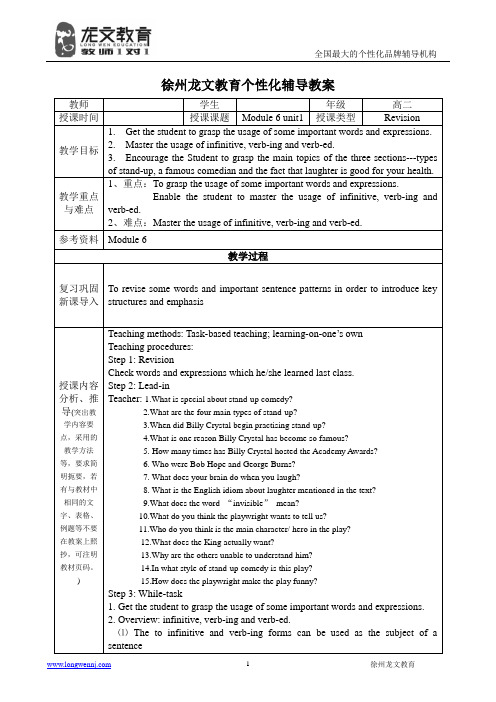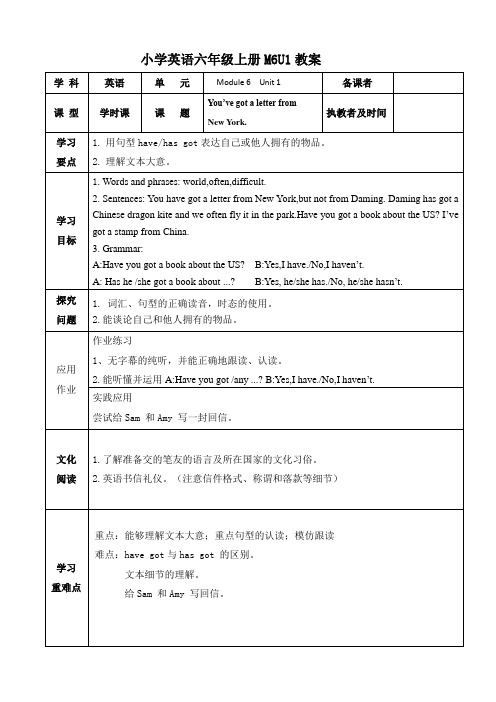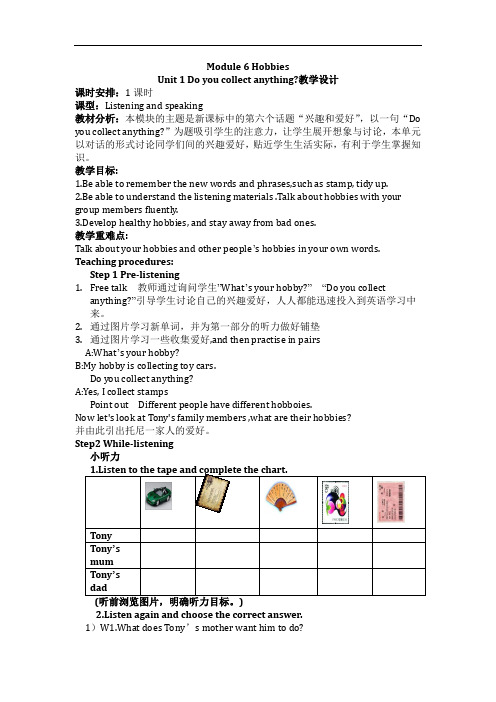模块六unit1 reading
外研版(三起点)小学五年级英语上册Module6_Unit1_ 优课教案

Module6 Unit1 教学设计You can play football well.一、教材分析“You can play football well”是《新标准英语》三年级起点五年级上册第六模块第一单元。
本模块要让学生了解和学习有关评价,肯定和鼓励的表达法,是对以前学过的关于能力的相关知识的拓展和延伸。
本单元通过Lingling加入足球队一事,让学生学会简单的自我评价和肯定与鼓励他人,进一步学会表达“can, well”句型。
另外,在本课学习并运用几个新的动词短语,pass the ball, catch the ball.二、学情分析本课的教学对象是五年级学生,经过两年多的英语学习,他们已经掌握了一定的语言基础知识,知道can、can’t、play basketball、play football、run fast、jump high 等单词及短语的表达;具备了一定的听、说、读、写和语言运用能力,如能运用Can you …? Yes, I can. / No, I can’t.来询问和表达能力;有兴趣继续听说和学习英语。
因此,在教学中应从学生的已有知识、能力和兴趣出发,充分运用各种教学手段,尽可能创设真实、有趣的语言情境,吸引和组织他们积极参与,使他们在参与、体验、合作与交流中,自然地习得语言,发展技能,从而提高实际语言运用能力。
三、教学目标(一)知识目标1、能听懂、会说并认读下列单词:well、team、really、good at、catch、goalkeeper、think、fantastic、fan.并会运用well、think、fan.2、能听懂、会说并认读下列句子:Can you run fast? Yes, I can. / No, I can’t. You can play football well.(二)能力目标1.能运用“can…well”句型评价自己和他人。
2.能够用自己的语言复述课文。
小学四年级英语课本第六模块第一二单元范读

Unit 1My name is Chen JieMy name is Chen Jie. I am twelve years old. I am in Grade 4. I like reading books. I have many books at home. I like to read stories. I like to read about animals, plants and people.I also like to read about science.I have a good friend. Her name is Wang Lili. She is also twelve years old. She is in the same class as me. We like to play together. We like to play hide-and-seek and other games.I also like sports. I like to play football and basketball. I like to play badminton too. I like to play with my friends.I have a pet. It is a dog. Its name is Doudou. It is very cute. It likes to play with me. It likesto eat bones.I love my family. My parents are very kind to me. They take care of me and give me a lot of love. I love them very much.Unit 2My homeThis is my home. It is a big house. It has two floors. On the first floor, there is a living room, a kitchen, a dining room and a bathroom. On the second floor, there is my room, my parents' room, my brother's room and a study.In the living room, there is a sofa, a TV and some chairs. We often watch TV and have a chat in the living room. In the kitchen, there is a refrigerator, a stove and some cupboards. We often cook and eat in thekitchen. In the dining room, there is a big table and some chairs. We often have our meals in the dining room.My room is on the second floor. It is very nice.I have a bed, a desk and a chair in my room.I often do my homework on the desk. I also have a lot of books in my room. I like to read books in my room.My brother's room is next to mine. It is also very nice. He has a bed, a desk and a chair in his room. He often plays computer games in his room.I love my home. It is very comfortable. I feel happy and safe at home.。
高中组 模块六unit1

徐州龙文教育个性化辅导教案教师学生年级高二授课时间授课课题Module 6 unit1 授课类型Revision教学目标1. Get the student to grasp the usage of some important words and expressions.2. Master the usage of infinitive, verb-ing and verb-ed.3. Encourage the Student to grasp the main topics of the three sections---types of stand-up, a famous comedian and the fact that laughter is good for your health.教学重点与难点1、重点:To grasp the usage of some important words and expressions.Enable the student to master the usage of infinitive, verb-ing and verb-ed.2、难点:Master the usage of infinitive, verb-ing and verb-ed.参考资料Module 6教学过程复习巩固新课导入To revise some words and important sentence patterns in order to introduce key structures and emphasis授课内容分析、推导(突出教学内容要点,采用的教学方法等,要求简明扼要,若有与教材中相同的文字、表格、例题等不要在教案上照抄,可注明教材页码。
) Teaching methods: Task-based teaching; learning-on-one‟s ownTeaching procedures:Step 1: RevisionCheck words and expressions which he/she learned last class.Step 2: Lead-inTeacher: 1.What is special about stand-up comedy?2.What are the four main types of stand-up?3.When did Billy Crystal begin practising stand-up?4.What is one reason Billy Crystal has become so famous?5. How many times has Billy Crystal hosted the Academy Awards?6. Who were Bob Hope and George Burns?7. What does your brain do when you laugh?8. What is the English idiom about laughter mentioned in the text?9.What does the word “invisible”mean?10.What do you think the playwright wants to tell us?11.Who do you think is the main character/ hero in the play?12.What does the King actually want?13.Why are the others unable to understand him?14.In what style of stand-up comedy is this play?15.How does the playwright make the play funny?Step 3: While-task1. Get the student to grasp the usage of some important words and expressions.2. Overview: infinitive, verb-ing and verb-ed.⑴The to infinitive and verb-ing forms can be used as the subject of a sentence⑵Non-finite verbs can be used as the attributive⑶Non-finite verbs can be used as the object complement in the sentence.In this case, the to infinitive often refers to an action that will happen in the future, the verb-ing form refers to an action that is taking place, and the verb-ed form has a passive meaning.Step 4: PractiseAsk the student to do some exercises according to the language points we have learned.Step5: Homework1. Textbook exercises2. Three papers of Reading and Grammar小结Summary: 1. Some important patterns and emphasis2. Some key words and expressions作业/思考题1.Three papers about Module 6 unit 1.2.All the words and expressions about Module 6 unit 1.课后反思(体会、得失分析、改进)学生对于本次课的评价:○特别满意○满意○一般○差学生签字:教师评定:1、学生上次作业评价:○好○较好○一般○差2、学生本次上课情况评价:○好○较好○一般○差教师签字:主任签字: 日期徐州龙文教育重难点讲解:一、Reading &Projectlanguage points1. response n. 回应,反应;回答respond vi 回应,反应(P 2)▲make responses to…对…做出答复▲in response to…答复…, 对..作出反应▲respond to… with…用…对…做出反应I offered to help him, but he didn‟t respond (= he made no response).我主动给他提供帮助,但他没有回应。
牛津英语模块六unit1--unit4知识点

牛津英语模块六unit1--unit4知识点Unit 1 Laughter is good for you (Module 6)【考点释析】 1. response n. 回应,反应;回答 respond vi 回应,反应 (P 2) ▲ make responses to … 对…做出答复 ▲ in response to … 答复…, 对..作出反应 ▲ respond to … with … 用…对…做出反应 I offered to help him, but he didn ’t respond (= he made no response). 我主动给他提供帮助,但他没有回应。
He responded to my advice with a smile. 他对我的建议报以一笑。
. = He smiled in response to my advice. 2. queue up 排队(等候) (P 2) ▲ queue up for 为…而排队等候 ▲ queue up to do 排队做某事 ▲ jump the queue 未轮到而抢先,插队 ▲ a queue of 一长列(车等) Children queued up for tickets. 孩子们排队等候买票。
They ’re queuing up to see a film. 他们排队看电影。
We shouldn ’t jump the queue at any place. 在任何地方我们都不应该插队。
There is a queue of cars at the traffic lights. 交通灯前有一长列汽车。
3. award vt. 奖励,授予; n. [C] 奖品,奖状,奖金 (P 2) ▲award sb. sth. / sth. to sb. 把某物颁发给某人 A prize was awarded to her for her contributions. 她因作出贡献而获奖。
小学英语六年级上册M6U1 教案

the format of the letters.)
各国人的 称呼:如 Chinese Japanese British
...
Work in four Share the words collection or cultural reading with group members. If they have some questions or difficulties, they can help each other or ask the teacher.
-Where is she from?
The UK
She is British.(not American)
Explain British.
British
What does Laura want to be?(pen friend)
China
Chinese
② Watch the video and find out the key
Walk around the classroom and answer the students’ questions.
复习已学 句型:Have
you got...?
1. Greetings. 2. Revision
Guessing game Guess: What has the teacher got?
answer the questions:
to answer the questions:
Who is Laura?
-Who is Laura?
Where does she live?(New York)
-Where does she live?
Where is she from?(the UK)
高二选修6 Unit 1 Art Warming up & Reading

a great deal of money / information / water
10. The first/last to do sth
• Our head teacher is always the first to arrive and the last to leave. • the first/last (one)之后固定后跟动词不定 式做定语。
personal possessions
他放弃了这房子的所有权。
possession He gave up ____________ of the house.
Page2
possess v.
Sb…in possession of 某人拥有某物 Sth..in the possession of sb 为某人拥有 Sth..in one’s possession He possesses two cars.
如果他不来的话,谁会替代他呢? Who will take the place of him if he doesn’t come? Who will take his place if he doesn’t come ? Page2
6. People became focused more on humans and less on religion. 人们变得多关心人,少关心宗教。 focus on 集中精力,注意力 = concentrate on come into focus 进入焦点 focus one’s attention on 集中注意力于 bring …into focus 把焦点聚焦于
他的目光集中在她身上。
His eyes _____________________ her. were focused on / upon 我要把镜头对准那儿的一群重要人物。 I’ll focus on the main group of people over there. This photograph looks funny; I think you forgot to focus the camera. Page2
初中英语_外研版八年级下册module6 unit1教学设计学情分析教材分析课后反思

Module 6 HobbiesUnit 1 Do you collect anything?教学设计课时安排:1课时课型:Listening and speaking教材分析:本模块的主题是新课标中的第六个话题“兴趣和爱好”,以一句“Do you collect anything?”为题吸引学生的注意力,让学生展开想象与讨论,本单元以对话的形式讨论同学们间的兴趣爱好,贴近学生生活实际,有利于学生掌握知识。
教学目标:1.Be able to remember the new words and phrases,such as stamp, tidy up.2.Be able to understand the listening materials .Talk about hobbies with your group members fluently.3.Develop healthy hobbies, and stay away from bad ones.教学重难点:Talk about your hobbies and other people’s hobbies in your own words. Teaching procedures:Step 1 Pre-listening1.Free talk 教师通过询问学生”What’s your hobby?”“Do you collectanything?”引导学生讨论自己的兴趣爱好,人人都能迅速投入到英语学习中来。
2.通过图片学习新单词,并为第一部分的听力做好铺垫3.通过图片学习一些收集爱好,and then practise in pairsA:What’s your hobby?B:My hobby is collecting toy cars.Do you collect anything?A:Yes, I collect stampsPoint out Different people have different hobboies.Now let's look at Tony's family members ,what are their hobbies?并由此引出托尼一家人的爱好。
Module 6 Unit 1 I’ve got some Chinese chopsticks.(

2、Watch the CD-ROM again, answer 3 questions
板书
设计
Module 6 Unit 1
I’ve gotsome Chinese chopsticks.
Have you got a book about the US?
My brother has got a Chinese kite.
反思
1. I ________ an English book .
2. _________Chinese people everywhere.
3. It _________ a long nose.
4.________a big Chinatown in New York.
5. Laura_________Chinese chopsticks.
通过Activity1的学习,呈现任务
通过问题的提出学习功能句和课文
在练习中巩固介绍节日的方法
通过检测检验教学目标的达成情况
作业
设计
listen and imitate Activity 2 two times. Master the words, sentences; finish your writing or retell the text.
(板书思维导图;找两个学生进行简短对话:Where are you from? How about...?)
- 1、下载文档前请自行甄别文档内容的完整性,平台不提供额外的编辑、内容补充、找答案等附加服务。
- 2、"仅部分预览"的文档,不可在线预览部分如存在完整性等问题,可反馈申请退款(可完整预览的文档不适用该条件!)。
- 3、如文档侵犯您的权益,请联系客服反馈,我们会尽快为您处理(人工客服工作时间:9:00-18:30)。
牛津高中英语教学设计—— M6 U1 Reading: Stand-up for your health教材版本、章节、学科、年级:《牛津高中英语》模块六高二上学期第一单元的阅读Stand-up for your health一、教学目标知识目标了解文中单口喜剧和主人公Billy Crystal的有关信息。
能力目标培养学生联系上下文的语境来猜测词义;把握文章内容结构和整体框架的能力。
人文目标引导学生意识到Laughter 的重要性,并以此为基点拓展对健康话题的认识,帮助学生以良好的心态和积极的方式去学习和生活。
(教学目标):1. Grasp the main topics of the three sections---types of stand-up, afamous comedian and the fact that laughter is good for your health.2. Learning English by talking about their own opinions when it comesto the topic “Laughter is the best medicine”.3. Gain some knowledge about stand-up comedy and reinforce theirreading comprehension.4. Improve reading ability---how to guess the meanings of newwords.二、教学内容及重点难点:本设计选取的是牛津高中英语模块六第一单元的阅读课文,它具有如下特点:第一:就体裁而言,本文是说明性文章,介绍的是西方流行的单口喜剧和著名单口喜剧演员Billy Crystal 。
因此,教学过程中应引导学生获取与主题相关的基本信息。
第二:就内容而言,单口喜剧来源于西方,不同于中国的相声,小品或滑稽戏,同学对此比较陌生,所以教学内容的重点之一就放在单口喜剧的分类和识别上。
另外; 通过对Billy Crystal的身份,能力和流行度的归纳来帮助学生加强对主人公的认识。
本文第三板块的主旨是Laughter is good for your health,采用讨论的方法拓展了同学对主题的理解并深化了主题。
第三:就结构而言,本文段落清晰。
因此,教学过程中应该引导学生体会和理解这种结构来运用到写作和演讲的实践中。
Important points(重点):1 Understand the structure of the whole passage.2 Understand the definition of stand-up as well as its type3 Get to know Billy Crystal4 How to guess the meaning of unknown or unfamiliar wordsDifficult points(难点):1.To develop the students’ reading skills.2.To make sure that everyone understand the article well3.To help the students guess the meaning of the words correctly4.To practice laughter is the best medicine in our daily life三、教学对象及其学习需要分析目前,高二学生经过一年多的高中英语学习,有一定的阅读技巧,但阅读过程中常局限信息碎片的获取而难以形成整体上的把握。
因此,引导学生学会从课文结构和内容层次分析的角度把握段落和文章。
高二学生已经具有一定的英语语言功底,部分学生能够较为自如地表达自己对一些事物的观点;另一部分学生在掌握了一些关键词汇的基础上也能就一定话题发表自己独到的看法,学生之间的合作学习也有了很好的发展。
通过上下文的语境来猜测词义是教学中一直强调的重点,学生在这一方面略有进步。
在本课的授课过程中采用了归纳课文内容和猜测词义相结合的方式,帮助学生加强这一能力的培养。
通过让他们积极参与实践、学习和使用英语,调动他们学习英语的兴趣。
四、教学媒体选择:计算机多媒体技术,投影仪,课件五、教学过程:教学方法:启发式、任务型阅读、师生互动Teaching procedures:Step1:Lead in1.Can you name these great comedians?2.Introduce Rowan Atkinsona well-known British comedian; famous for the character Mr. Bean. Mr. Bean is funny because he makes funny faces, he acts stupidly, he seems to be quite silly, and the things he does are strange.3. A joke for the Ss to enjoy.A joke usually makes you laugh, and there are other things that will make you laugh. Besides the forms we mentioned above, what else can make us laugh?[Explanation]喜剧的幽默能激发学生的学习热情,让学生从熟悉的中国喜剧笑星到外国的憨豆先生熟悉本单元的话题Laughter并适时地通过与学生的对话引出本课的话题stand-up,然后从一个图文并茂的笑话入手,引起学生的兴趣,接着再问起还有哪些形式会引人发笑也就顺理成章。
在这个过程中引入“stand-up”这个概念很容易引起学生的好奇,为下一步的阅读做好铺垫,并有利于他们对课文的理解. Step2: Fast Reading1 What is stand-up?A kind of comedy.2.Where is stand-up comedy usually done?On a stage.3. Who is Billy Crystal?A famous comedian.4.What is laughter good for?Our health.[Explanation]让学生通过阅读第一段和小标题获取文章主体意思,既可以避免学生长时间阅读的沉闷,又可以引导学生对文章首段和小标题的关注,有利于其阅读策略的养成。
Step3:Reading StrategyGo through the reading strategy, and find out how to guess themeaning of new words.1. The writer will give the meaning of difficult or technical vocabularyin the sentences around it.2. The way a word is used may also give you some idea of themeaning.[Explanation]疏通阅读策略,让学生知道遇到生单词时可以通过两种方法来猜测单词的意思。
Step4Detailed Reading1.Read the part of “Types of stand-up”Ask the Ss to find out the different types of stand-up and explainthem.(If the Ss don’t know the meaning the new words of the four types,guide them to guess from the context.)2.Read the part of “A famous comedian”(1)Ask the Ss to read the first few lines and answer the question “Whois mentioned here as a famous comedian?”—Billy Crystal(2)Ask the Ss to read this part carefully and try to complete the file forBilly Crystal. When talking about Billy’s idols, give the Ss someinformation about Bob Hope and George Burns.(3)Ask the Ss to discuss in groups of 4: “What special qualities should acomedian have?”(The teacher can give some answers a fter the discussion, but don’tlimit the students’ answers.)3.Read the part of “Laughter is good for your health”Ask the Ss two questions:(1) What does your brain do when you laugh?--When you laugh, your brain sends chemicals around your body that are good for you.(2)What is the English idiom about laughter mentioned inthe text?--“Laughter is the best medicine”[Explanation]因为课文本身的三个部分相对独立,让学生分部分阅读有利于学生注意力的集中和教师的有效引导。
“Types of stand-up”部分让学生根据原文找到四种不同类型之后,再即时应用,让学生再运用中真正理解文本内容。
“A famouscomedian”部分让学生填写Billy Crystal的档案,有利于学生有条理的寻找所需要的信息,并且教师在这一部分补充一定的其他信息,让学生所了解到的人物更完整和丰满。
“Laughter is good for your health”部分比较简单,主要让学生了解“笑有利于健康”并知道为什么就可以了,因此可以简单处理。
